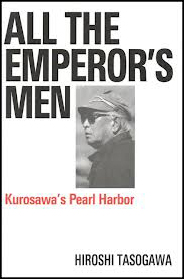For almost 80 years, Kirkus Reviews has served as the industry bible for bookstore buyers, librarians, and ordinary readers alike. Now Popdose joins the Kirkus Book Bloggers Network to explore the best — and sometimes the worst — in pop-culture and celebrity books.
This week, we look at one of the towering geniuses of cinema — and at the strange and humiliating episode that nearly scuppered his career…
 Maybe we expect too much of our artists. We try and remind ourselves that they are only human; but when a novel or a film makes a statement that elevates us, that speaks of our common humanity in a voice true and wise, it can be a huge letdown to discover that its creator hold divisive political views, or harbors unexamined prejudices. When the artist is the late filmmaker Akira Kurosawa — whose works remain beloved the world over for their powerful statements on timeless themes — the letdown carries a special sting.
Maybe we expect too much of our artists. We try and remind ourselves that they are only human; but when a novel or a film makes a statement that elevates us, that speaks of our common humanity in a voice true and wise, it can be a huge letdown to discover that its creator hold divisive political views, or harbors unexamined prejudices. When the artist is the late filmmaker Akira Kurosawa — whose works remain beloved the world over for their powerful statements on timeless themes — the letdown carries a special sting.
But there’s no earthly reason I should feel upset or betrayed to learn, say, that Kurosawa could be inflexible and dismissive, given to snap judgments that hardened into lifelong grudges, or that he had a colossal ego, rejecting out of hand collaborators he felt were unworthy of him. Not every great artist can also be a terrific human being, and vanity and condescension are failings to which all men are heir. Indeed, these flaws, highlighted in Hiroshi Tasogawa’s recent account All the Emperor’s Men: Kurosawa’s Pearl Harbor, make Kurosawa more than ever a universal figure, simply by humanizing him.
But Tasogawa’s book, which chronicles the great director’s abortive involvement with the 1970 Japanese-American coproduction Tora! Tora! Tora!, highlights aspects of Kurosawa’s worldview that are troubling in a different way. The film dramatized the 1941 attack on Pearl Harbor from both the American and Japanese perspectives, telling parallel stories that intersected at the climax. The film was the brainchild of producers Elmo Williams and Darryl Zanuck, who brought Kurosawa on board in the early planning stages with the thought that he would write and direct the Japanese sequences. It seemed like a genius move all around; Kurosawa’s involvement would bestow upon Tora! Tora! Tora! both authenticity and cachet, while Kurosawa — who had grown disillusioned with the Japanese studio system — saw the picture as his ticket to a career in Hollywood.
But he also saw in Tora! Tora! Tora! an opportunity to rehabilitate the image of his homeland — to emphasize the audacity and boldness of its wartime strategy, and wipe away the stigma of cowardice from the surprise attack. He saw it as setting the record straight; some in Hollywood (and in the US military, whose cooperation was essential to the making of the film) saw it as rewriting history…
Read the rest of this article at Kirkus Reviews!





Comments